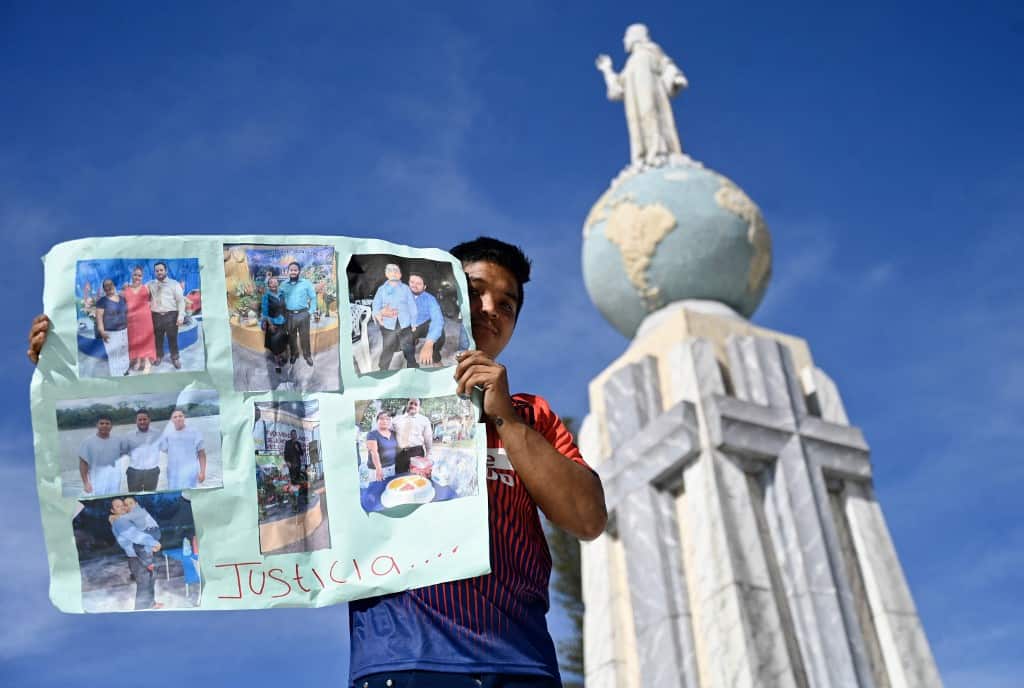Dozens of relatives of detainees held under an exception regime, which was extended for a month on Tuesday to fight gangs in El Salvador, marched demanding their release and claiming their innocence.
In the march in San Salvador, the capital, in which human rights organizations also participated, people carried small signs with the photo of their detained relative.
The demonstrators, most of them wearing white t-shirts, reached the area around the Presidential House, whose access was blocked.
María Gloria Sánchez, 60, called for the release of her daughter Laura Maribel Pacheco, 22, who was detained by police on April 17 at her home in a populous neighborhood in the city of San Martín, on the eastern outskirts of the capital.
“The police came to the house, asked for my daughter and detained her without explaining the reason, they only told me that it was because of the (emergency) regime,” Sanchez told AFP.
Pacheco worked in a maquila and supported her mother.
“It hurts because she has done nothing wrong, she is innocent,” added Sanchez, who said her daughter remains in a women’s prison in the eastern sector of San Salvador.
“Freedom, freedom,” shouted Sebastiana Bermudez, 50, who cried out for the innocence of her son Irvin Alcides Amaya, 28, detained on April 7.
“My son was arrested at his work, he is a baker, and they took him away accused of (belonging to) illegal groups,” Bermúdez explained to AFP.
The only thing she knows about him, she said, is that he is in good health in a prison in the northern sector of San Salvador.
Extension of the Emergency Regime
On Tuesday the Legislative Assembly, controlled by President Nayib Bukele’s allies, decided to extend at least until the end of August an exception that allows arrests without a warrant.
In his “war” against gangs, Bukele asked Congress at the end of March to approve this exception after a wave of murders perpetrated by these organizations. The measure, which is in force for 30 days, has been extended month by month by the Parliament.
The emergency regime suspends the freedom of association, the right to defense of a defendant, extends the period of preventive detention from 3 to 15 days and allows the interception of communications.
Members of the ruling party and of the minority opposition engaged in a debate on the capture of innocent people who are imprisoned along with gang members.
Marleni Funes, deputy of the opposition left wing, accused the government of “changing the presumption of innocence (…) for presumption of guilt”, imprisoning young people from poor communities.
For his part, Guillermo Gallegos, deputy of the ruling Gran Alianza Nacional (Gana), considered that “the regime of exception should be in force until the last gang member is captured”.
“A gang member has no rights and even less human rights, because he had no mercy, no mercy, no pity to murder, rape, extort so many people in this country”, emphasized Gallegos.
According to the Justice and Security Ministry, as of Monday 46,694 people, alleged gang members, had been arrested under Bukele’s plan, which has broad citizen support.
His “war” against gangs has been criticized by human rights organizations and Washington, which denounce possible abuses against detainees who have not been proven guilty.
The MS-13 and Barrio 18 gangs are the most active gangs in El Salvador. Before the government’s onslaught, some 16,000 of their members were incarcerated.






